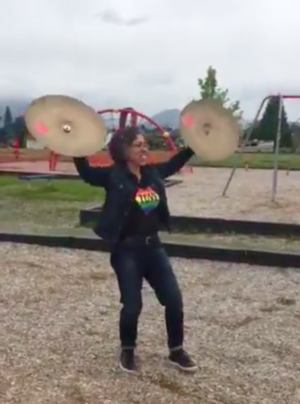Stewarding a Community of Learners: On Strong Leadership

The DLC recently interviewed Jillian Lewis, an educator with 30 years of tenure, about her experience in school leadership during the pandemic. Jillian had intended to make Spring 2020 her “farewell tour”, heading into retirement following 10 years as Principal of Brentwood Park Elementary School in Burnaby, BC, with her sights cast towards travelling the world with her partner, and embarking on a second career as “DJ Groove Heart". However, COVID-19 called her plans into question. This fall, Principal Lewis will be doing a victory lap with her school community, stewarding a culture of belonging as empty hallways begin to fill with students. Because of the “profound connection” she feels to her school community, “it just didn't seem like the right time to to walk away.”
While a recent survey revealed that urban school leaders are struggling with stress, frustration, and anxiety related to the pandemic, which can potentially lead to burnout, the disruption of our usual state of affairs can also inspire in leadership a kind of renaissance as educators revisit and question the values and methodologies that underlie their school learning cultures.
As Lewis describes, the pandemic has been an opportunity for public education to “reinvent schooling”, and “rethink what we are doing”. Posing questions like: “How does this serve the community?”, “How does this serve the school culture?”, “How does this serve students?”, “Is this necessary?”, is pivotal for helping educators reevaluate the status quo.
One example of this, Lewis mentions, is reconsidering the utility of school bells, which–with four recess and two lunch sessions throughout the day–she noticed seemed to ring “incessantly”, as schools reopened last May and June. As a way to replace the autopilot bell-ringing and “inject fun into the world”, Lewis clashed cymbals together to signal the start and end of breaktimes, much to students’ delight.
Creating “common experiences” is foundational to forming the strong relationships that, as Lewis remarks, are intrinsic to building an inclusive school community, a “community of learners”. Their school garden became a place for students and staff to find such common ground during the pandemic, as one teacher began leaving “provocations” there–little messages which then became a community chain of correspondence.
One strategy that Lewis uses to build connection at her school is the concept of a “focus student”. Teachers are encouraged to choose three “focus students” each day. Focus students speak to their peers and teachers about their interests and goals, which their learning community supports them to achieve, enabling each student to develop their voice. What has been surprising to Lewis is how some students have been thriving beyond all expectations during the pandemic, causing her to question, “What is it about our pedagogies that limit students in one setting but allow them to thrive in another setting?”
As Lewis observes, the pandemic has also shone a spotlight on ways that students and families are struggling, and how “continuing to make sure kids and families have access to as many resources as we can possibly provide” is vital. Students with special needs are particularly missing the in person connections and supports that school provides. This has motivated Lewis and her staff to find ways to help these students interact as much as possible with their peers and adults in the virtual space, and figure out “how we can wrap ourselves around struggling students” as a community.
The concerns that students with special needs, their families, and their teachers have about “falling behind” the curriculum as a result of the pandemic may be especially pronounced. However, as Lewis’ reminds us, “three months are a short blip out of a [student’s] 13 year public education career... If we don't address the social and emotional needs that are very prevalent right now, we're not going to get to the learning. And so, I think we really do need to focus on well being… the well being of the students, their families and ourselves. This is really a mental health challenge that we're all facing and if we don't come to terms with the mental health piece of it, we're not going to have space for the academic piece.”
Brentwood Park Elementary has been using the Heart-Mind Well-Being Framework since 2013. As Lewis has observed, “if a student is struggling in one area of the framework, that area is typically Secure & Calm”. At this time of global uncertainty, levels of anxiety are escalating, and emotions are heightened. Emotional literacy, and acknowledging feelings, is therefore integral to supporting the emotional needs of students and staff.
Conscientious of the importance of expressing the full spectrum of emotions, Lewis often refers to Marc Brackett’s Mood Meter. One approach she uses in staff meetings, to allow for playful dissent, is the “snowball fight”: Staff write down a contentious on a piece of paper, crumple it up, throw it across the room, and then each person reads out what is written on the piece of paper is closest to them.
Ultimately, however, Lewis strives for staff to leave with a “sense of optimism”, “consensus”, and “cohesion”–especially when conversations on important and weighty topics like anti-racism and Truth & Reconciliation must take place.
“There's a big tent. We can all fit in the tent with love. So speak up. Come in the tent with us and even if you don't want to speak up, come inside the tent with us.”
Appropriately, Lewis draws the analogy between building a strong school culture and a strong “immune system”, which is strengthened over time through relationships. Immune systems are also fortified by diversity, and Lewis, who describes herself as “the poster child of diversity”, champions a school culture that affirms people of all walks of life. By building a strong school community, where staff and students feel safe to ask for help and lean on one another for support–and differences are embraced rather than devalued–school leaders play an important role in setting the stage for growth and resilience during these challenging times. Jillian Lewis, AKA “DJ Groove Heart”, is one strong example.
Lewis will be a featured panelist in our upcoming Heart-Mind Live Webinar, “Welcome Back: Connection and Belonging in Our Schools”. Learn more, and register here!

A still of DJ Groove Heart in action.







Comments
Post new comment